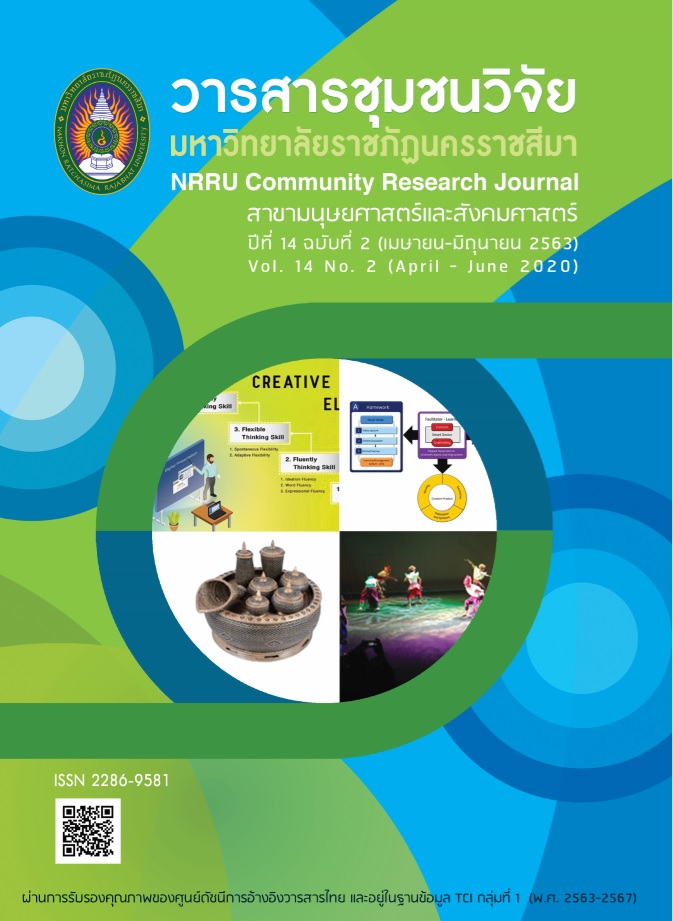INFLUENCE ENHANCEMENT FACTORS FOR SERVICE QUALITY ON ROAD FREIGHT TRANSPORTATION SERVICE PERFORMANCE OF LOGISTICS SERVICE PROVIDERS
ปัจจัยเสริมสร้างอิทธิพลของคุณภาพการบริการ ที่มีต่อสมรรถนะการให้บริการขนส่งสินค้าทางถนนของผู้ให้บริการโลจิสติกส์
DOI:
https://doi.org/10.14456/nrru-rdi.2020.25Keywords:
Service quality, Performance, Logistics service providers, Operating experience, Logistics information technology, ModeratorAbstract
The research aimed to study factors that enhance the influence of service quality on the performance of logistics service providers of road freight transportation with the organization’s operational experience and logistics information technology as a moderator. Data were collected from 120 logistic service providers of road freight transportation in the category of public trucks in Thailand, by sending questionnaires to the target group via the postal channel. Probability sampling was to use the cluster random sampling due to the sample groups were diverse in experience, organization size, and service model. Data were analyzed by using descriptive statistics with mean, percentage and standard deviation, and inferential statistics by analyzing the hierarchical regression with moderator variable to enhance the influence of the relationship between service quality and performance of logistics services provider.
The results showed that the sample groups had a high level of opinions regarding the service quality ( =4.17), with the opinion of the guarantee being at the highest level (
=4.39). As for the aspect of overall service efficiency, it was at a moderate level (
=3.10), with opinion of the internal process views at a high level (
=4.10). Besides, the research found that the factor of organization’s operational experience and logistics information technology had not helped to reinforce the direct influence between the service quality toward the efficiency of logistics service providers of road freight transportation at the statistical significance level of 0.05.
References
Bae, H. S. (2016). The Moderating Effect of Logistics Information Systems on Interorganizational Collaboration and Performance of Korean Shipping and Logistics Firms. International Journal of e-Navigation and Maritime Economy, 5, 85-96. doi:10.1016/j.enavi.2016.12.007.
Chen, M. C., Hsu, C. L., & Lee, L. H. (2019). Service Quality and Customer Satisfaction in Pharmaceutical Logistics: An Analysis Based on Kano Model and Importance-Satisfaction Model. International Journal Environmental Research and Public Health, 16(21), 4091. doi:10.3390/ijerph16214091.
Department of Land Transport. (2018). Number of transport licenses as of 31 December 2018. Retrieved June 24, 2019, from https://web.dlt.go.th/statistics/ (In Thai).
Faul, F., Erdfelder, E., Buchner, A. & Lang, A. G. (2013). Statistical Power Analyses Using G*Power 3.1: Tests for Correlation and Regression Analyses. Behavior Research Methods, 41, 1149-1160. https://doi.org/10.3758/BRM.41.4.1149.
Fu, H., Lima, S., & Rocha, A. (2018). Factors influencing user usage intention on intelligent logistics information platform. Journal of Intelligent & Fuzzy Systems, 35(3), 2711-2720. doi:10.3233/jifs-169623.
Kaplan, R. S. & Norton, D. P. (1996). Using the Balanced Scorecard as a Strategic Management System. Harvard Business School Publishing Corporation.
Kline, R. B. (2005). Principles and practice of structural equation modeling (2nd ed.). New York : Guilford Press.
Kockelman, K., Chen, D., Larsen, K. & Nichols, B. (2013). The Economics of Transportation System: A Reference for Practitioners. Retrieved May 10, 2019, from https://ctr.utexas.edu/wp-content/uploads/pubs/0_6628_P1.pdf
Lane, B. W. (2019). Revisiting ‘An unpopular essay on transportation:’ The outcomes of old myths and the implications of new technologies for the sustainability of transport. Journal of Transport Geography, 81, 102535. doi:10.1016/j.jtrangeo.2019.102535.
Le, D. N., Nguyen, H. T., & Hoang Truong, P. (2019). Port logistics service quality and customer satisfaction: Empirical evidence from Vietnam. The Asian Journal of Shipping and Logistics. doi:10.1016/j.ajsl.2019.10.003.
Likert, R. (1967). The Method of Constructing and Attitude Scale. New York : Wiley & Son.
Malhotra, M. K., & Grover, V. (1998). An assessment of survey research in POM: from contructs to theory. Journal of Operations Management, 16(4), 407-425. https://doi.org/10.1016/S0272-6963 (98)00021-7.
Nur, F. B. M. Z., Sazali, A. W., & Abdullah, A. M. (2017). Logistics Capability, Logistics Performance and The Moderating Effect of Firm Size: Empirical Evidence from East Coast Malaysia. The Journal of Developing Areas, 51, 171-182.
Office of the National Economic and Social Development Council. (2018). Thailand’s Logistics Report 2018. Retrieved June 20, 2019, from https://www.nesdb.go.th/ewt_dl_link.php?nid=9359 (In Thai)
Overstreet, R. E., Hall, D., Hanna, J. B., & Kelly Rainer, R. (2011). Research in humanitarian logistics. Journal of Humanitarian Logistics and Supply Chain Management, 1(2), 114-131. doi: 10.1108/20426741111158421.
Parasuraman, A., Zeithaml, V. A., & Berry, L. L. (1985). A conceptual model of service quality and its implications for future research. Journal of Marketing, 49(3), 41-50.
Piriyakul, M. (2015). Moderator and mediator in Structural Equation Modeling. The Journal of Industrial Technology, 11(3), 83-95. (In Thai).
Rovinelli, R. J., & Hambleton, R. K. (1977). On the use of content specialists in the assessment of criterion-referenced test item validity. Dutch Journal of Educational Research, 2, 49-60.
Sadowska, B., & Lulek, A. (2015). Logistics costs and balanced scorecard in business management. Ekonomiczne Problemy Ustug, 120, 91-104. doi:10.18276/epu.2015.120-07.
Tavakol, M., & Dennick, R. (2011). Making sense of Cronbach’s alpha. International journal of Medical Education, 2, 53-55.
Wilson, C. R., Voorhis, V., & Morgan, B.L. (2007). Understanding Power and Rules of Thumb for Determining Sample Sizes. Tutorials in Quantitative Methods for Psychology, 3(2), 43-50. doi:10.20982/tqmp.03.2.p043.
Wilson, D. B., & Lipsey, M. W. (2001). The role of method in treatment effectiveness research: Evidence from meta-analysis. Psychological Methods, 6(4), 413-429. https://doi.org/ 10.1037/1082-989X.6.4.413.





